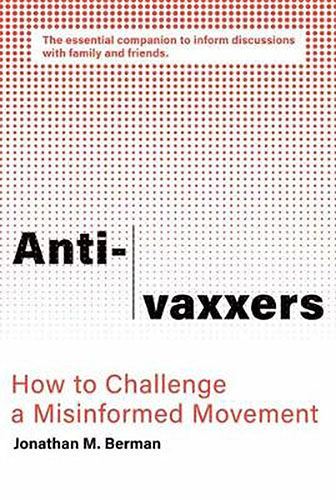As a nurse working in a care home where many residents have died of COVID-19, I’ve been increasingly frustrated about anti-vaxxers.
These include two members of my immediate family, one my disabled 87-year-old father, who insists that he’ll be better off ‘in the long run’ without a COVID-19 vaccine. Nothing I say can persuade him otherwise.
I had high hopes, then, for this book, with its enticing subtitle. Published last year – but too late for COVID-19 to make an appearance, except in the preface – Anti-vaxxers focuses on childhood vaccination, but makes some compelling points for those trying to counter anti-COVID vaccine arguments.
Written by a science professor who was a lead organiser in the 2017 March for Science, Anti-vaxxers takes us through the history of the anti-vaccine movement, from the Anti-Compulsory Vaccination League in 1866 to Andrew Wakefield’s now-discredited claims that the MMR vaccine was linked to autism in young children.
Jonathan Berman looks at how misinformation about vaccines spreads, particularly through the use of social media, and why many parents are worried about vaccination.
In his necessarily brief reference to COVID-19, Berman suggests that anti-vaxxers are likely also to be dismissive of social distancing, although he doesn’t mention masks, which were not widely used at the time of writing.
Berman suggests that traits that stand out in this group are: a lack of trust in medical authorities; a misunderstanding of the scale of human suffering; ignorance of science; and a tendency to compare COVID-19 with seasonal flu.
Berman distinguishes between confirmed anti-vaxxers and the vaccine-hesitant, who may be open to persuasion.
The point of useful intervention, he says, is with the vaccine-hesitant, to persuade them of the value of vaccination before they are converted into confirmed anti-vaxxers.
Berman recommends against online debates or providing alternative information. It’s not primarily about information; it’s about how people feel, and which groups they identify with.
The last chapter is ‘What changes minds?’ Unfortunately, it’s only a few pages long, and is mostly taken up with examples of individual parents, rather than campaigns that target the wider community.
I’d have liked to read far more about what has worked in persuading the vaccine hesitant. What a lot of it boils down to seems to be that people may change their minds if they’re not judged or beaten over the head with science, but instead are given examples of positive vaccine experiences by people they know and trust.
Anti-vaxxers present vaccination as purely an individual choice. The reality is that it’s a community responsibility.
Those of us who can get vaccinated, should, in order to protect those who can’t and those for whom the vaccine doesn’t work.
I got my vaccine at the first opportunity, sure that it was the right thing not just to protect me, but to protect others. Nothing is going to persuade my father to get vaccinated but perhaps this book might help persuade those who are vacillating.


